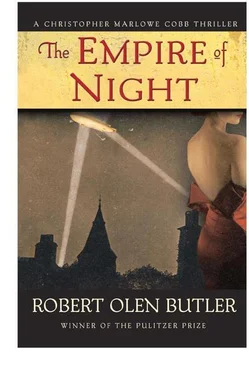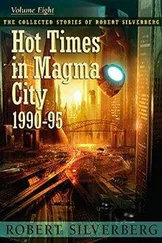“You must be tired,” Stockman said.
“Yes.”
“As am I.”
We’d sung together. There was no more to say tonight.
We rose.
I reached into my pocket for my wallet and he waved away the gesture.
“Thank you,” I said.
I circled the table and he stepped from behind it to face me.
We shook hands.
But before I could move away, he put his hand on my arm. He leaned near me. He smelled of Joppenbier , as no doubt did I. He said, in German, “They bring only isolated neighborhood disruptions. Commonplace, soon enough.”
I slept and woke and slept and woke again, working Stockman’s curtain line over and over in my head. I assumed this had been his response to my leading comment about the Zepp attacks missing something. He’d initially been quite professional and had clammed up. Maybe he and I singing together about the joy of the German Empire had made it personal. The thought that followed his fleeting smile kept working in him, and he finally said a little something. I’d gotten a glimpse at his mission, though it was as fleeting as the smile.
Too fleeting. So the problem with the Zeppelins he’d been studying was that their attacks were too isolated? True enough. Smart enough. But everyone in London knew to fear the day when the attacks were carried out by thirty airships at a time instead of two, when the fires and crumbling buildings would appear all over the city instead of in a few isolated neighborhoods. The Germans simply had to build more of these machines. Which they presumably were gearing up to do.
This was a big idea but an obvious one. I couldn’t figure why it would require their secret ally in the British Parliament to come to Berlin. The trip certainly wasn’t about being with my mother. Whatever he felt for her, that was a useful ruse. He’d discovered that the British secret service was sniffing around, but his boys scrubbed down the castle overnight just fine. He didn’t have to take off in the middle of the night. Indeed, it would have been swell for him if the authorities had stormed in and found him reading a book in the library of a house that didn’t hold a single shred of the evidence they sought against him. Perhaps he would have waited another day to depart if Jeremy hadn’t shown up, but it had already been planned. He was here for something crucial. This wasn’t about building more Zepps faster.
My mind gave out somewhere near dawn.
I woke for good a couple of hours later and headed for the Lessing Theater.
It sat in massive isolation on an odd wedge of land, pressing up against the Stadtbahn railway viaduct on one side and looking out onto the River Spree on the other. It resembled a cathedral more than a theater, with twin, flat-topped towers and a central dome. Fronting the building was a portico with four sets of double columns and four more sets above, holding a gabled roof.
I passed through the portico and into the lobby. It was dim and cool inside, for a late morning in August, and I was immediately stopped by a vaguely uniformed old man stationed on a chair. The mention of my name drew an instant nod toward the doors directly ahead of me.
I crossed the lobby floor and went up a short flight of stairs and stood before the center door into the auditorium. My hand hesitated at the handle, as I heard a familiar voice projecting not just to the back row but beyond.
I opened the door very gently and only far enough to slip through and step sideways into the shadow of the aisle behind the last row of the orchestra seats. The house lights were off but failed to shroud the auditorium’s golden rococo flourishes on its proscenium and on the facings of the side balconies and loge boxes. The stage was uniformly bright from the electric utility lights. Downstage center was my mother.
She was to-being and not-to-being. A few rows before me, a man with broad shoulders was standing with his head angled backward sharply, as if looking into the dark above. Concentrating. Herr Regisseur , no doubt. The director. The estimable Victor Barnowsky, the rival of Max Reinhardt and the creative director of the Lessing, who was personally guiding the acclaimed Isabel Cobb’s Shakespearean adventure in Bard-loving Berlin.
My mother was dressed for rehearsal in knickers and a white shirt. She rolled to the end of her soliloquy, and as soon as she heard the fair Ophelia approach, Barnowsky lowered his head and said in good English, but with a heavy German accent, “Sweet prince, may I stop you now, bitte ?”
My mother gracefully fell from character, moved the few steps to the very edge of the stage, and bowed toward her director. “Of course, mein Regisseur ,” she said.
Barnowsky bowed in return.
A blond actress in shirtwaist and skirt — the fair Ophelia, no doubt — who had appeared upstage, quietly withdrew.
Barnowsky said, “If, please, we may hear this speech in your German. Our German cast will join you tomorrow, but I was hoping to listen just a little. Yes?”
Mother bowed once more, returned to her place, lifted her face, closed her eyes, took a deep breath as she slid back into her Hamlet — her Schlegel-voiced Hamlet — opened her eyes again, and began: “ Sein oder Nichtsein; das ist hier die Frage.”
Barnowsky watched her for a few lines more and then lifted his face once again to the theatrical heavens, simply to listen.
She was good. The only significant German she knew were the lines in plays. But she could mimic anything. Anyone. Any feeling. Any nuance of any feeling. No matter what the words were. I knew the language well enough now to hear and think and feel in German, and she was very good. And I was struck by this: in the German language, Hamlet’s infamous hesitation to kill his murderous uncle was even harder to swallow.
But she would pull off that actor’s challenge too, I had no doubt.
She ached and agonized and yearned on until at last she said, “ Still. Die reizende Ophelia. Nymphe, schließ in dein Gebet all meine Sünden ein.”
She fell silent.
Barnowsky began to clap. Slowly, heavily, and then faster and faster. My mother became my mother and she beamed from the stage. She bowed. She curtsied. She put her hand on her heart.
“Excellent,” Barnowsky said. “Now let us have an interval to rest and to eat.”
My mother slipped offstage right. Barnowsky moved to the stage-right aisle and started down it. I figured he would surely lead me to her. I stepped through the center entrance to the orchestra and hustled along to follow him. From an opening just this side of the orchestra loge, my mother emerged. She and the director embraced in the way famous directors and famous actresses who were not sleeping together but felt a legitimate warmth for each other during the lifetime of a production typically did.
I slowed. I was watching them in profile, though my mother was turned slightly toward me. She would see me soon enough. I stopped only a few feet away.
The embrace ended.
As Barnowsky was saying, “You are everything in this great adventure that I imagined and still more,” her eyes flitted briefly to me and then back to her director.
“As are you, mein Liebling ,” she said.
And now she made a little bit of a show at noticing me.
“Ah, Victor, may I introduce you to my chronicler,” she said.
He was turning to me.
“The man I mentioned to you,” she said.
I stepped forward, extending my hand to him.
He took it strongly.
Barnowsky had a square face and heavy eyebrows and seemed on the surface to be a roughhouser, reminding me of Ike Bloom’s boys from the First Ward. I liked this about him, seeing as he was also one of Gorky’s boys and Strindberg’s boys and Shakespeare’s boys.
Читать дальше












